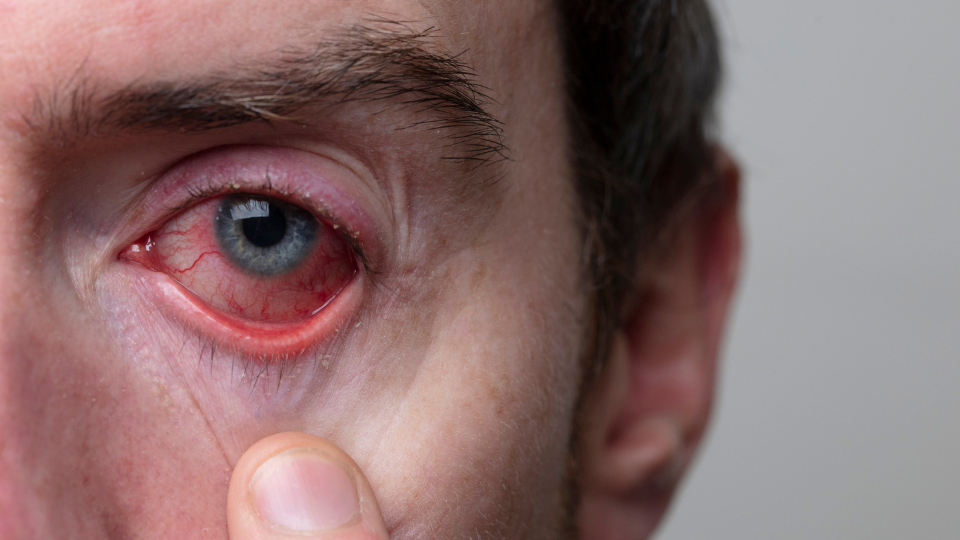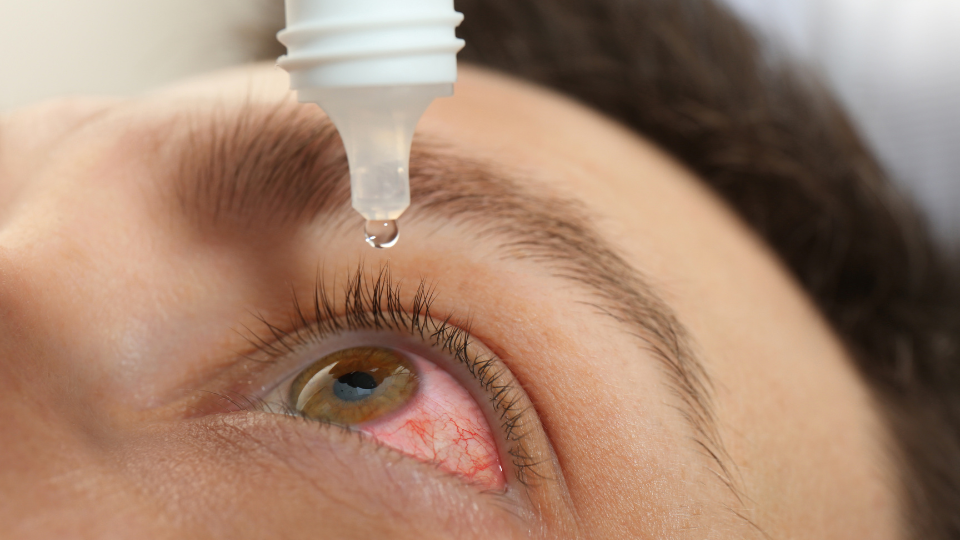Pink eye, also known as conjunctivitis, is a common eye condition that can cause discomfort and concern. With its characteristic symptoms of redness, itching, and discharge, many individuals find themselves wondering whether they should seek urgent care or manage the symptoms at home. This article aims to clarify when urgent care is necessary for pink eye and how telehealth services, such as Doctronic, can provide assistance.
 Understanding Pink Eye
Understanding Pink Eye
Pink eye is an inflammation of the conjunctiva, the thin membrane that covers the white part of the eye and lines the eyelids. This condition can be caused by various factors, including viruses, bacteria, allergens, and irritants. Understanding the type of pink eye you are experiencing is crucial in determining the appropriate course of action.
Types of Pink Eye
There are three primary types of pink eye: viral, bacterial, and allergic. Each type has its own set of symptoms and treatment options.
Viral Pink Eye: Often associated with colds, this type is highly contagious but usually resolves on its own within a week or two.
Bacterial Pink Eye: This type can produce a thicker discharge and may require antibiotic treatment. It is also contagious.
Allergic Pink Eye: Triggered by allergens such as pollen or pet dander, this type is not contagious and can often be treated with antihistamines.
Symptoms to Watch For
Common symptoms of pink eye include:
Redness in one or both eyes
Itching or burning sensation
Discharge that may be watery or thick
Crusty eyelids upon waking
Increased sensitivity to light
If you experience any of these symptoms, it’s essential to assess their severity before deciding on a treatment plan. In some cases, symptoms may worsen or lead to complications, such as keratitis, which is an inflammation of the cornea. This can result in vision problems if not addressed promptly. Therefore, monitoring your symptoms closely is vital, especially if they persist beyond a few days or are accompanied by severe discomfort.
Additionally, it’s important to consider the potential for pink eye to spread, particularly in communal environments such as schools or daycare centers. Practicing good hygiene, such as frequent hand washing and avoiding touching the face, can help prevent the transmission of diseases. If you suspect that your pink eye is contagious, it may be wise to stay home from work or school until you have consulted with a healthcare professional and received appropriate treatment.
When to Seek Urgent Care
While many cases of pink eye can be managed at home, there are specific situations where urgent care is advisable. Knowing when to seek professional help can prevent complications and ensure a swift recovery.
Severe Symptoms
If you are experiencing severe symptoms such as intense pain, significant swelling, or vision changes, it is crucial to seek immediate medical attention. These symptoms may indicate a more serious underlying condition that requires prompt treatment. For instance, conditions like keratitis or uveitis can present with similar symptoms but may lead to more serious complications if left untreated. Early diagnosis and intervention can make a significant difference in the outcome, potentially preserving your vision and alleviating discomfort.
Persistent Symptoms
Should your symptoms persist for more than a few days without improvement, it may be time to consult a healthcare professional. Bacterial infections, in particular, may require antibiotic treatment to resolve. Additionally, if you notice any discharge that is particularly thick or colored, this could signal a bacterial infection that necessitates a different approach than viral conjunctivitis. Remember that while viral pink eye often resolves on its own, bacterial forms can worsen if not addressed, leading to further complications such as corneal ulcers.
Pre-existing Conditions
Individuals with pre-existing eye conditions or compromised immune systems should also consider seeking urgent care if they develop symptoms of pink eye. These factors can complicate the condition and necessitate specialized care. For example, those with a history of glaucoma or cataracts may be at increased risk for complications, as pink eye can exacerbate these existing issues. Furthermore, individuals undergoing chemotherapy or those with autoimmune disorders may find that their bodies respond differently to infections, making it essential to consult a healthcare provider promptly to tailor a treatment plan that addresses their unique needs.
Telehealth as an Option
For many, the thought of visiting an urgent care facility can be daunting, especially during times of high illness transmission. Fortunately, telehealth services like Doctronic offer a convenient alternative for those seeking medical advice for pink eye.
Benefits of Telehealth
Telehealth allows patients to consult with healthcare professionals from the comfort of their own homes. This can be particularly beneficial for conditions like pink eye, where a visual assessment can often be conducted remotely.
Accessibility: Telehealth services are available 24/7, making it easy to get the help you need at any time.
Cost-Effective: Many telehealth consultations are affordable, often costing less than traditional doctor visits.
Personalized Care: Services like Doctronic provide an AI-driven experience that remembers your medical history, ensuring personalized and informed care.
How Doctronic Works
Using Doctronic is simple. Patients can access the platform online to discuss their symptoms and receive a comprehensive assessment. The AI synthesizes the latest medical research and offers treatment recommendations, which can be shared with a primary care physician if needed.
With over 10 million users, Doctronic has established itself as a trusted resource for individuals seeking immediate medical advice without the need for an in-person visit.
Moreover, the platform is designed with user-friendliness in mind, allowing individuals of all ages to navigate the system with ease. This is particularly important for parents who may need to seek advice for their children’s health issues, as the intuitive interface guides them through the process of describing symptoms and understanding the next steps. Additionally, Doctronic employs strict privacy measures to protect user data, ensuring that consultations remain confidential and secure.
Telehealth is not just a temporary solution; it represents a shift in how healthcare is delivered. As more people become accustomed to using digital platforms for their medical needs, the potential for telehealth to integrate with wearable technology and other health monitoring devices grows. This could lead to even more personalized treatment plans, as real-time data can be shared with healthcare providers, allowing for more proactive management of conditions like pink eye and beyond.
Home Remedies for Mild Cases
For mild cases of pink eye, there are several home remedies that may provide relief. While these remedies can be helpful, they should not replace professional medical advice if symptoms worsen.
Warm Compresses
Applying a warm compress to the affected eye can help alleviate discomfort and reduce swelling. Simply soak a clean cloth in warm water, wring it out, and place it over your closed eye for several minutes. This method not only helps soothe irritation but can also promote drainage of any discharge that may be present, making it easier for the eye to heal. For added benefits, consider using a chamomile tea bag as a compress; chamomile is known for its anti-inflammatory properties, which may further enhance comfort and reduce redness.
Artificial Tears
Over-the-counter artificial tears can help soothe dry, irritated eyes. These lubricating drops can provide relief from symptoms and help flush out any irritants. It's important to choose preservative-free options if you plan to use them frequently, as preservatives can sometimes cause further irritation. Additionally, using artificial tears regularly can help maintain moisture in the eyes, which is particularly beneficial in dry or windy environments. Remember to follow the instructions on the packaging for optimal use and consult a pharmacist if you have questions about which product might be best for your situation.
Good Hygiene Practices
Practicing good hygiene is essential to prevent the spread of pink eye, especially if it is contagious. Wash your hands frequently, avoid touching your face, and refrain from sharing personal items like towels and pillows. It's also advisable to change pillowcases and towels daily during an outbreak to minimize the risk of re-infection. Additionally, consider using disposable tissues instead of handkerchiefs, as these can harbor bacteria. If you wear contact lenses, it’s best to switch to glasses until the infection clears up, as lenses can trap irritants and exacerbate symptoms. Keeping your living environment clean and well-ventilated can also help reduce the presence of allergens and irritants that may contribute to eye discomfort.
 Pink Eye Treatment: Knowing Your Options
Pink Eye Treatment: Knowing Your Options
In summary, while pink eye can often be managed at home, there are specific instances where urgent care is necessary. Severe symptoms, persistent issues, and pre-existing conditions warrant a professional evaluation. For those seeking convenience and accessibility, telehealth services like Doctronic offer an excellent alternative to traditional urgent care visits.
By understanding the nature of pink eye and knowing when to seek help, individuals can ensure they receive the appropriate care while minimizing discomfort and potential complications. Always consult a healthcare professional if in doubt, as timely intervention can make all the difference.
Experience the Future of Healthcare with Doctronic
Don't let pink eye slow you down. With Doctronic, you can receive quality care in seconds, directly from the comfort of your home. Our AI doctor is designed to provide you with the most modern medical advice, tailored specifically to your needs, and it's always available 24/7. Whether you need a quick AI diagnosis or a convenient telehealth video visit with one of our doctors, Doctronic is here to offer you personalized, smart, and fast medical care. Skip the line. Talk to an AI Doctor Now, for free.



 Understanding Pink Eye
Understanding Pink Eye Pink Eye Treatment: Knowing Your Options
Pink Eye Treatment: Knowing Your Options